Did you know that businesses using a CRM system experience a 29% increase in sales? In today’s competitive landscape, managing customer relationships effectively is not just an option—it’s a necessity. For engineering firms, where project management, client interactions, and intricate workflows are the norms, selecting the right Customer Relationship Management (CRM) system can make all the difference.
In this comprehensive guide, we’ll explore the Best CRM for engineering firms, comparing top solutions tailored to meet the unique needs of engineering businesses. Whether you’re a small startup or a large established firm, finding a CRM that aligns with your specific requirements is pivotal for driving growth, enhancing customer satisfaction, and streamlining operations.
Choosing the right CRM isn’t merely about tracking leads or managing contacts; it’s about fostering lasting relationships, optimizing workflows, and ensuring that every project runs smoothly from inception to completion. This article delves into the essential features you should look for in a CRM, reviews the top CRM solutions for engineering firms, and provides actionable steps to help you make an informed decision.
What to Look for in a CRM for Your Business
As your engineering firm grows, so do your customer base, projects, and data. A scalable CRM system is crucial to accommodate this growth seamlessly. Look for a CRM that can handle increasing data volumes, support more users, and offer advanced features without compromising performance. Scalability ensures that your CRM remains a valuable asset, adapting to your evolving business needs without requiring a complete overhaul.
An intuitive interface and a straightforward onboarding process are vital, especially for engineering teams that may not have extensive experience with CRM systems. A user-friendly CRM minimizes the learning curve, allowing your team to adopt the system quickly and efficiently. Features such as drag-and-drop functionality, customizable dashboards, and clear navigation contribute to ease of use, ensuring that your team can focus on what they do best—engineering—without being bogged down by complicated software.
Every engineering firm has unique workflows, project management styles, and client interaction protocols. A customizable CRM allows you to tailor the system to fit your specific business processes. Whether it’s custom fields, tailored reporting, or specific automation rules, the ability to adjust the CRM to your needs ensures that it supports your operations effectively. Customization not only enhances efficiency but also ensures that the CRM aligns perfectly with your business objectives.
6 Best CRM Solutions for Engineering Firms
When it comes to selecting the Best CRM for engineering firms, several options stand out due to their robust features, flexibility, and ability to cater to the specific needs of the engineering industry. Here are six top CRM solutions that engineering firms should consider:
1. HubSpot CRM
HubSpot CRM is an easy-to-use, comprehensive platform that caters to businesses of all sizes. It provides a robust set of tools for sales, marketing, and customer service, making it a strong option for engineering firms looking to streamline operations and enhance client relations.
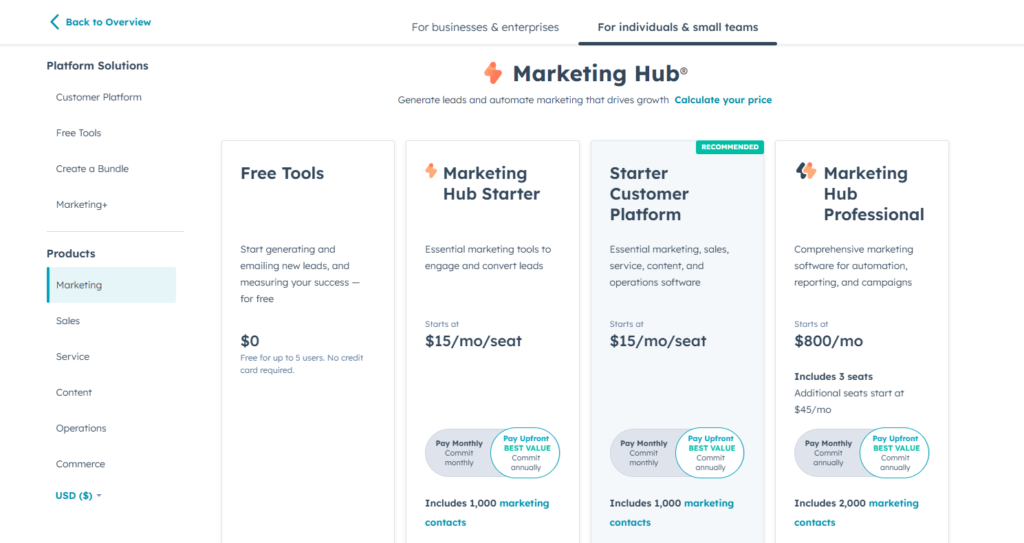
Key Features:
- Contact Management: Store and manage client data efficiently.
- Sales Pipeline Management: Track projects, contracts, and leads from inquiry to closure.
- Email Tracking and Automation: Keep communications in check and automate follow-ups.
- Custom Dashboards and Reporting: Tailor reports to track engineering project metrics and performance.
- Integrations: Easily connect with third-party apps like project management or accounting tools.
- Task Automation: Automate repetitive tasks, freeing up time for critical engineering work.
- Document Management: Store important files, plans, and contracts securely.
Pricing:
- Free Plan: $0 for core features like contact management, live chat, and deal pipelines.
- Starter: $15/month for more advanced tools, including email automation and task management.
- Professional: $800/month, adding advanced reporting, sales forecasting, and deeper customization.
- Enterprise: $3,600/month for large engineering firms needing enterprise-level features, advanced reporting, and more customization options.
Mid-to-large engineering firms needing a scalable CRM with strong project tracking, reporting, and automation capabilities. Ideal for firms looking to manage complex sales cycles or those that rely heavily on detailed client interactions.
2. Pipedrive CRM
Pipedrive is a user-friendly, sales-focused CRM designed to help businesses manage and automate their sales pipeline. It’s highly visual and simple, making it an excellent tool for engineering firms looking to streamline client acquisition and project management workflows.
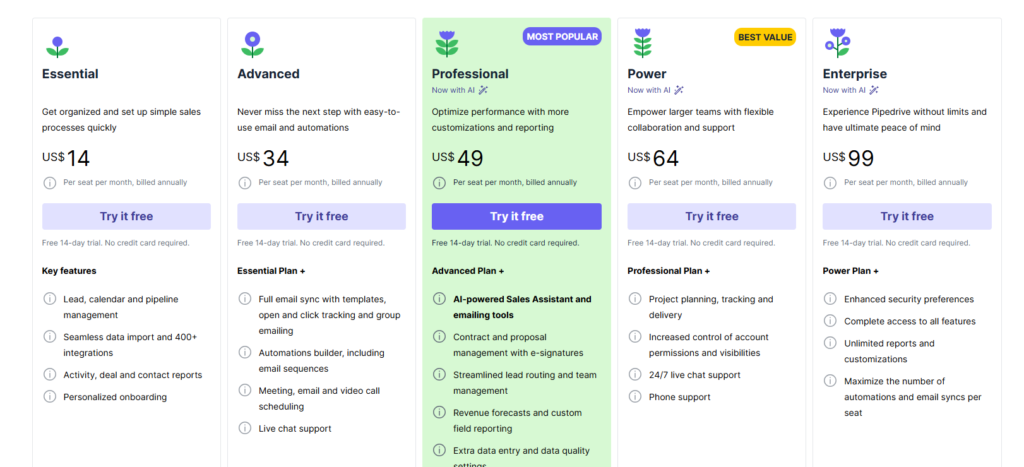
Key Features:
- Visual Sales Pipeline: Easily track deals and projects with a drag-and-drop interface, ideal for managing engineering projects from lead generation to project completion.
- Customizable Pipelines: Tailor your pipeline stages to fit the engineering project cycle, ensuring effective tracking of client needs and project milestones.
- Email Integration & Automation: Automate follow-ups and sync emails, reducing manual tasks and enhancing client communication.
- Smart Contact Data: Pulls relevant client data automatically to save time on research.
- Project Reporting: Provides clear insights into deal progress, expected revenue, and performance, which is crucial for monitoring engineering project budgets and timelines.
- Task Management: Automate reminders and tasks to keep your team on top of client interactions and deadlines.
Pricing:
- Essential Plan: $14/month per user for basic CRM tools like deal pipelines and contact management.
- Advanced Plan: $34/month per user adds full email sync, automation, and additional customization.
- Professional Plan: $49/month per user offers enhanced reporting, team management, and revenue forecasting.
- Power Plan: $64/month per user, designed for scaling teams with advanced permissions, custom roles, and workflow automation.
- Enterprise Plan: $99/month per user for full customization, premium support, and unlimited reporting.
Small to mid-sized engineering firms looking for a CRM to manage sales processes and client relationships efficiently. It’s especially suited for firms needing clear visibility into projects and who value ease of use over advanced, complex features.
3. Keap CRM
Keap is an all-in-one CRM designed to help businesses automate their sales and marketing efforts, making it ideal for engineering firms looking to streamline operations and client communications.
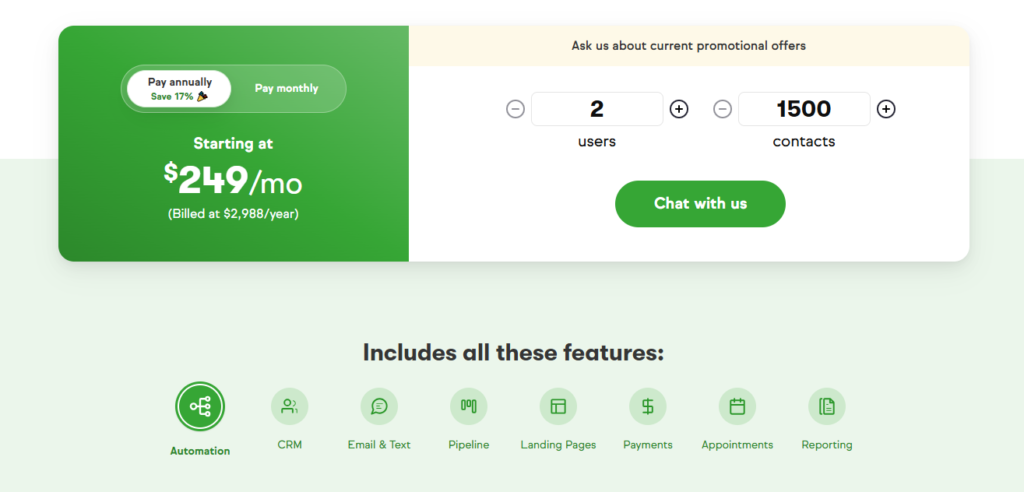
Key Features:
- Automation & Workflow Management: Automates repetitive tasks, ensuring timely follow-ups and smoother project management.
- Lead Capture & Nurturing: Helps engineering firms track client interactions and follow-up processes efficiently, improving lead conversion.
- Sales Pipeline Management: Visualizes sales stages, making it easy to track project bids, contracts, and progress.
- Email Marketing & Campaigns: Allows custom email automation for updates, newsletters, or project announcements.
- Appointment Scheduling: Simplifies client meetings, ensuring better collaboration on engineering projects.
- Custom Reports: Tailored insights on project timelines, sales, and customer interactions, useful for data-driven decision-making.
Pricing:
- $299/month for 1,500 contacts and 2 users.
- Additional users can be added for extra fees.
Small to mid-sized engineering firms with a need for automated client interaction processes, task management, and those looking to improve project tracking and client retention. Ideal for firms juggling multiple projects and clients at once.
4. Salesforce
Salesforce is a highly customizable, cloud-based CRM platform that caters to businesses of all sizes. It offers comprehensive tools for managing sales, service, and customer relationships, making it a strong choice for engineering firms with complex project workflows and diverse client bases.
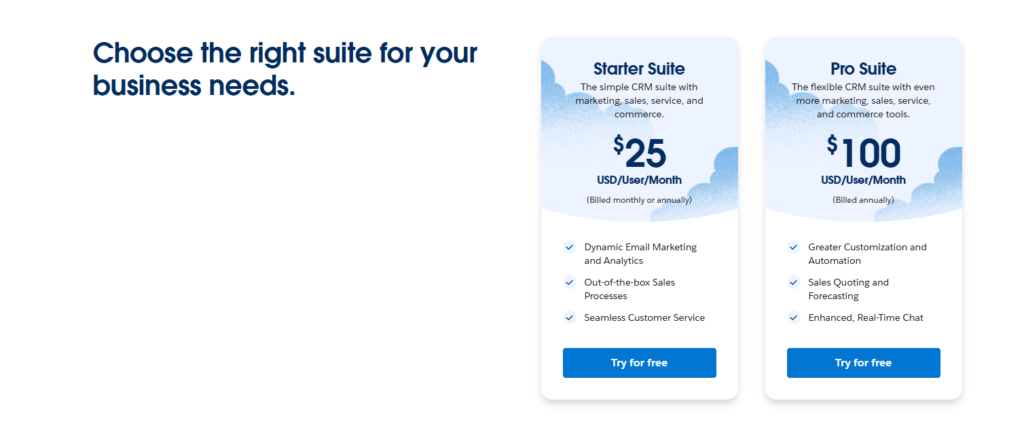
Key Features:
- Customizable Dashboards & Reports: Engineering firms can create tailored dashboards to track project milestones, performance, and client interactions.
- Lead & Opportunity Management: Helps firms manage client relationships from initial contact to project completion, ensuring no opportunity is missed.
- Project Management Integration: Seamlessly integrates with third-party project management tools, which is essential for tracking engineering projects.
- Document & Contract Management: Centralized storage for project documents, contracts, and proposals, helping engineering teams stay organized.
- Collaboration Tools: Salesforce’s Chatter feature allows team members to collaborate on projects, sharing updates and feedback in real-time.
- Automation & AI Tools (Einstein AI): Automates routine tasks like follow-ups and client communications, and offers predictive insights to optimize decision-making for complex engineering projects.
Pricing:
- Essentials Plan: $25/user/month.
- Professional Plan: $75/user/month.
- Enterprise Plan: $150/user/month (ideal for engineering firms with advanced needs).
Medium to large engineering firms with complex project workflows that need advanced customization, project tracking, and in-depth reporting. Ideal for firms that manage large client portfolios and multi-phase projects requiring extensive collaboration and document management.
5. Zoho CRM
Zoho CRM is a cloud-based CRM platform known for its affordability and extensive customization options. It is designed to help businesses of all sizes manage customer relationships, sales pipelines, and automate processes, making it a solid choice for engineering firms looking for flexibility without a steep learning curve.
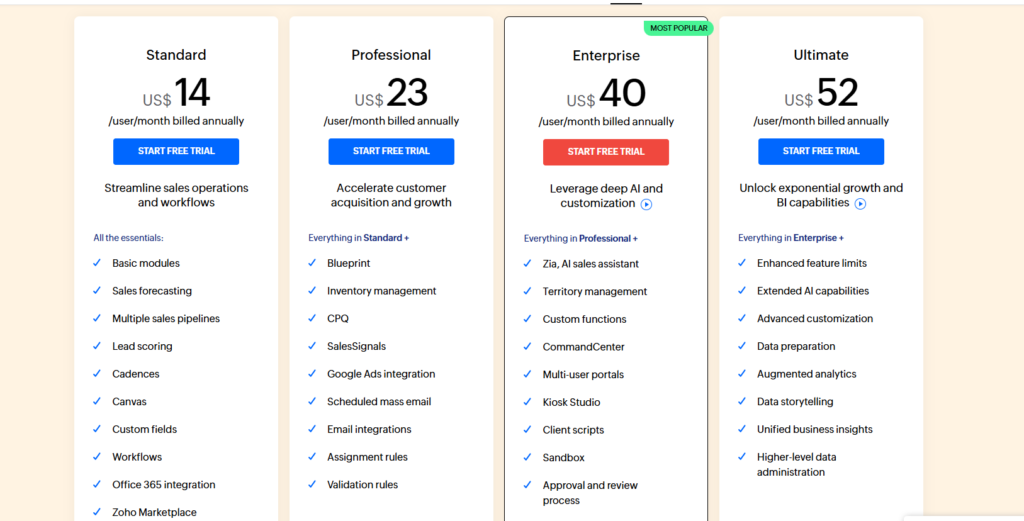
Key Features:
- Customizable Sales Pipelines: Engineering firms can create and track tailored sales pipelines to manage leads, contracts, and ongoing projects.
- Workflow Automation: Automates tasks like follow-up emails, approvals, and task assignments, saving time on administrative work.
- Blueprints for Process Management: Helps firms define and automate project workflows, from client onboarding to project delivery, ensuring consistency and compliance.
- Lead & Contact Management: Centralized client and project information, helping engineering firms manage client relationships and follow up on proposals.
- Reporting & Analytics: Provides detailed insights on project performance, sales pipelines, and client activity, aiding data-driven decision-making.
- Integrations: Supports integration with various project management, invoicing, and engineering-specific tools for seamless operations.
Pricing:
- Standard Plan: $14/user/month.
- Professional Plan: $23/user/month.
- Enterprise Plan: $40/user/month.
- Ultimate Plan: $52/user/month.
Small to medium-sized engineering firms looking for a cost-effective, customizable CRM with strong automation and reporting features. Ideal for firms that want to streamline their sales processes, improve client follow-ups, and gain better insights into project progress without a heavy financial investment.
Which CRM is Best for Your Engineering Firm?
After evaluating the top CRM solutions, Hubspot CRM emerges as a standout choice for engineering firms seeking a comprehensive, scalable, and highly customizable CRM system. Its extensive feature set, robust integration capabilities, and strong support infrastructure make it a reliable choice for firms of all sizes.
Use Case Recommendations
- Salesforce CRM: Ideal for large engineering firms that require extensive customization, advanced analytics, and integration with a wide range of third-party applications.
- HubSpot CRM: Perfect for small to medium-sized engineering firms looking for a user-friendly, cost-effective solution with strong marketing automation features.
- Zoho CRM: Suitable for firms seeking a balance between affordability and functionality, with robust customization options and integration capabilities.
- Pipedrive: Best for engineering firms focused on sales pipeline management and seeking a straightforward, easy-to-use CRM.
- Insightly: Great for firms that need strong project management features integrated with their CRM.
- Microsoft Dynamics 365: Ideal for firms already using Microsoft products, offering seamless integration and powerful analytics.
Next Steps
To take the next step in optimizing your customer relationship management, consider starting a free trial or scheduling a demo with the recommended CRM providers. This hands-on experience will help you assess which CRM aligns best with your firm’s specific needs and workflows.
How to Choose a CRM: A Beginner’s Buying Guide for Engineering Firms
Selecting the right CRM can be daunting, especially for beginners. Here’s a step-by-step guide to help you navigate the process:
- Identify Your Business Needs
- Assess your current workflows, pain points, and specific requirements. Determine what you need the CRM to achieve, such as improving customer service, enhancing project management, or increasing sales efficiency.
- Evaluate Key Features
- Look for essential CRM features like contact management, lead tracking, sales forecasting, and reporting. Additionally, consider industry-specific features such as project management tools, time tracking, and resource allocation.
- Consider Budget Constraints
- Determine your budget for a CRM system. While some CRMs offer robust features at a lower cost, others may require a higher investment. Ensure that the CRM you choose provides the best value for your budget.
- Assess Customization and Scalability
- Ensure that the CRM can be customized to fit your workflows and can scale as your business grows. This flexibility is crucial for adapting to changing business needs without significant additional costs.
- Check Integration Capabilities
- Your CRM should seamlessly integrate with other tools and software you use, such as project management systems, accounting software, and communication platforms. Integration ensures a unified workflow and reduces data silos.
- Evaluate User Experience and Support
- A user-friendly interface and comprehensive support are vital for smooth implementation and ongoing use. Look for CRMs that offer training resources, responsive customer support, and active user communities.
- Test with a Free Trial
- Most CRM providers offer free trials or demo versions. Take advantage of these to test the CRM’s functionality, ease of use, and how well it fits with your team’s workflow before making a commitment.
- Review Security Features
- Ensure that the CRM has robust security measures in place to protect your data. Look for features like data encryption, regular backups, and compliance with industry standards.
- Seek Feedback from Your Team
- Involve your team in the decision-making process. Gather feedback on what they need from a CRM and ensure that the chosen system meets their expectations and requirements.
- Make an Informed Decision
- After thorough evaluation, choose the CRM that best aligns with your business needs, budget, and long-term goals. Remember that the right CRM is an investment that can drive significant growth and efficiency for your engineering firm.
Conclusion
Selecting the best CRM for engineering firms is a critical decision that can significantly impact your business’s efficiency, customer satisfaction, and overall growth. We’ve explored the essential features to look for in a CRM, reviewed the top CRM solutions tailored for engineering firms, and provided a step-by-step guide to help you make an informed choice.
When choosing a CRM, consider not only your current needs but also your long-term business goals. A scalable and customizable CRM will adapt to your evolving requirements, ensuring that it remains a valuable tool as your engineering firm grows. Prioritize ease of use and integration capabilities to ensure smooth adoption and seamless workflows across your team.
Ready to transform your customer relationship management? Explore the best CRM for engineering firms by starting a free trial with Salesforce, booking a demo with HubSpot, or comparing features with Zoho CRM. Take the first step towards optimizing your business operations and enhancing your customer relationships today!
FAQs
Do I really need a CRM?
Absolutely. A CRM system helps streamline your customer interactions, manage leads, track sales, and enhance customer satisfaction. For engineering firms, a CRM can also aid in project management, ensuring that client requirements are met efficiently and effectively.
How secure is my data in a CRM?
Data security is a top priority for reputable CRM providers. Most CRMs employ advanced security measures, including data encryption, regular backups, and compliance with industry standards like GDPR. Always review the security features of a CRM before implementation to ensure your data is protected.
Can a CRM integrate with my existing tools?
Yes, most modern CRMs offer integration capabilities with a wide range of tools and software, including project management systems, accounting software, email marketing platforms, and more. Integration ensures a unified workflow and reduces the need for manual data entry.
What is the cost of implementing a CRM system?
The cost of a CRM system varies depending on the provider, the number of users, and the features you require. Some CRMs offer tiered pricing plans to accommodate different budgets. It’s essential to assess your needs and choose a CRM that offers the best value within your budget.
How long does it take to set up a CRM?
The setup time for a CRM depends on its complexity and the level of customization required. Basic CRMs can be set up in a few hours, while more advanced systems may take several weeks. Proper planning and utilizing available resources, such as tutorials and customer support, can expedite the setup process.
Can a CRM help with project management?
Yes, many CRMs offer project management features or integrate seamlessly with project management tools. These features allow you to track project progress, manage tasks, allocate resources, and ensure that client projects are completed on time and within budget.
Is training required to use a CRM?
While many CRMs are designed to be user-friendly, some training can help your team utilize the system more effectively. Most CRM providers offer training resources, including tutorials, webinars, and customer support, to help your team get up to speed quickly.
How does a CRM improve customer retention?
A CRM helps you manage and analyze customer interactions, enabling you to understand their needs better and provide personalized service. By maintaining detailed customer profiles and tracking communication history, a CRM allows you to proactively address issues, nurture relationships, and ultimately improve customer retention.
What should I do if my CRM doesn’t meet my needs?
If your CRM isn’t meeting your needs, consider customizing it to better align with your workflows or exploring other CRM options that offer the features you require. Most CRM providers offer flexible solutions and support to help you optimize the system for your business.
Can a CRM help increase sales?
Yes, a CRM can significantly increase sales by streamlining the sales process, improving lead management, and providing valuable insights through analytics. By automating tasks and enhancing communication, a CRM allows your sales team to focus on closing deals and building strong customer relationships.
I’m Rejaul Karim, an SEO and CRM expert with a passion for helping small businesses grow online. I specialize in boosting search engine rankings and streamlining customer relationship management to make your business run smoothly. Whether it's improving your online visibility or finding better ways to connect with your clients, I'm here to provide simple, effective solutions tailored to your needs. Let's take your business to the next level!


